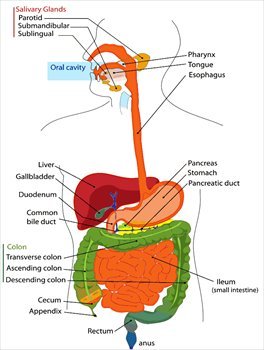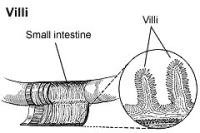What is the Cause of Celiac Disease? What is Celiac Disease Anyway?
The effects of Celiac Disease are many and varied.
It is a great mimic of other diseases and is frequently misdiagnosed as another intestinal ailment. It is more than a wheat allergy. It is an autoimmune disease that is inherited.
It is much more common than formerly believed. Recent studies show the incidence to be at least 1 in 133 people in the U.S. It is very under-diagnosed, as at this time over 90% of the people who have it don't know that they have it.
What Causes Celiac Disease?

The disease is the result of an autoimmune response to
gluten in the diet. The consumption of gluten containing
foods causes an immune reaction in the small intestine in those people with active disease. The body begins to make
antibodies to gliadin, a component of gluten. The antibodies
attack the cells of the small intestine itself. This causes
damage to the small intestine, and so it is the cause of celiac disease.
There are two genes that are associated with celiac.
They are usually described as HLA DQ2 and HLA DQ8. On the 6th chromosome, the HLA type has 9 possible genes. Of those 9, it is DQ2 and/or DQ8 that is present in over 95% of diagnosed
patients. (HLA is a protein on white blood cells).
While someone may carry one of the genes, it means that they
are susceptible to the illness. It is not until something
triggers the body to an autoimmune reaction that the process
actually begins.
Some are triggered very early in life, possibly by a severe
infection. Others can be triggered later in life by pregnancy,
trauma of some kind (like an accident or emotional trauma), or
severe stress.
So having the gene does not mean that there is an active case. It does indicate the susceptibility. It only requires one copy of the gene to cause celiac. Each parent contributes one gene to their child. So if either parent has a celiac gene, and contributes that gene, the child is a potential celiac. It is also possible to have inherited one celiac gene from each parent, thus meaning you carry two genes. In this case the person will be even more likely to develop the disease.
Once the disease is triggered, the immune system begins to attack
the villi in the small intestine, eroding them gradually away.
Without villi, food cannot be absorbed properly. So the body becomes deficient in many nutrients. Malabsorption of vitamins and minerals can lead to many problems as the body tries to function without the essential elements that it needs.
 One of the first things that happens is that the enzyme lactose is no longer produced as it is made by the tips of the villi, which are the first part to erode away. So milk becomes difficult to digest.
One of the first things that happens is that the enzyme lactose is no longer produced as it is made by the tips of the villi, which are the first part to erode away. So milk becomes difficult to digest.
The symptoms vary from one patient to another. In some people
there are no symptoms at all. Often other gastrointestinal diseases are diagnosed when actually celiac disease is the underlying cause of the symptoms.
If you suspect you might have this disease you should see your doctor for testing. If you have no insurance, you might
want to consider a home test. If neither of these is possible,
then a trial of at least 3 months gluten free, and then the
gradual reintroduction of gluten over one week's time may
give you your answer. You will have to make sure that you
avoid hidden gluten in the diet during the trial.
This disease can progress to the point that the person is so weak they cannot function. It can make them bedridden. Often they will have lost a great deal of weight by the time they reach this stage. If they continue to consume gluten, they may not survive.
from Cause of Celiac Disease back to What is Celiac Disease?
from Cause of Celiac Disease back to Gluten Free Diet Help Home Page







 One of the first things that happens is that the enzyme lactose is no longer produced as it is made by the tips of the villi, which are the first part to erode away. So milk becomes difficult to digest.
One of the first things that happens is that the enzyme lactose is no longer produced as it is made by the tips of the villi, which are the first part to erode away. So milk becomes difficult to digest.